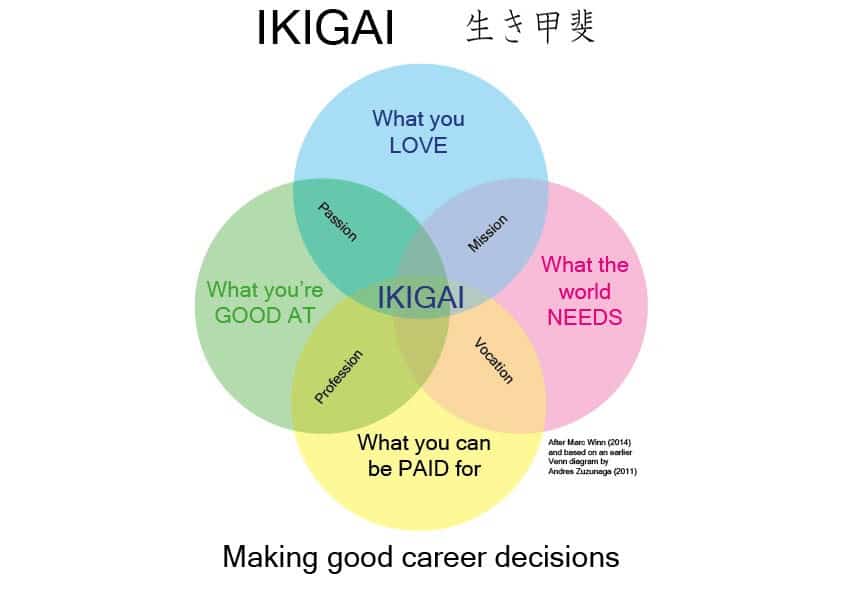Understanding who you are, what you have to offer, your personality, values and skills is an essential first step in sound career decision-making. That’s why we believe that psychometric self-assessment tools such as Morrisby can be a vital step in ensuring that career paths are selected that will lead to personal fulfilment and career satisfaction. When you consider that a lifetime career might involve 100,000 hours at work, the importance of making satisfactory choices should be self-evident.
In Japan, the concept of Ikigai refers to the sense of meaning which emanates from an individual’s strengths, values and beliefs. It is often said to equate to ‘a reason to get out of bed every morning’.
Your ikigai is at the intersection of what you are good at and what you love doing.
Hector Garcia
“Your ikigai is at the intersection of what you are good at and what you love doing,” says Hector Garcia, the co-author of Ikigai: The Japanese Secret to a Long and Happy Life [1]. Originating from the Okinawan archipelago, some commentators believe that the extreme longevity of local residents could be attributed to their feeling of ikigai. It seems that keeping busy doing the things that give your life meaning is good for your health and wellbeing[2].
The concept is not unrelated to the positive psychology movement that suggests that we should place more emphasis on our ‘strengths’ when choosing our futures. Strengths are defined as the things we are good at and that energise us. In the diagram below, the sense of well-being that comes from ikigai is felt at the intersection between what we are good at and what we love. The happiness is further enhanced when we can identify a career that the world needs and for which we will be financially rewarded.

But an equally important part of career decision-making is making choices which are grounded in the real world. So, half of the Venn diagram (the pink and the yellow circles) also leads us to consider what is it that the world needs and also, just as practically, what remuneration we are likely to receive. For today’s young people, this involves having access to good quality labour market information (LMI). Fortunately, there are numerous sources in and through which meaningful data can be obtained. Platforms such as Morrisby, Unifrog and EClips all facilitate research into possible careers and the current labour market.
Contemplation of what the world needs highlights the fact that young people choosing a sector (and employer) will want to gain insights into the working culture and the values adopted by the particular businesses and institutions in which they might work. Do those organisations have an excellent corporate social responsibility (CSR) policy and, in addition, do they behave in a sustainable way with regards to the environment?
It is often said that ‘you can be anything you want to be.’ That is probably going too far. But the philosophy behind ‘strengths’ and ikigai suggests that it would be better to say that ‘you cannot be anything you want to be – but you should try to be a lot more of who you already are.’ Using the four circles of the Venn diagram as filters to consider possible careers should help us choose a career that is both happy and fulfilling.
[1] García, H. and Miralles, F. (2017) The Japanese Secret to a Long and Happy Life
[2] https://www.bbc.com/travel/article/20201126-why-so-many-japanese-live-to-100



